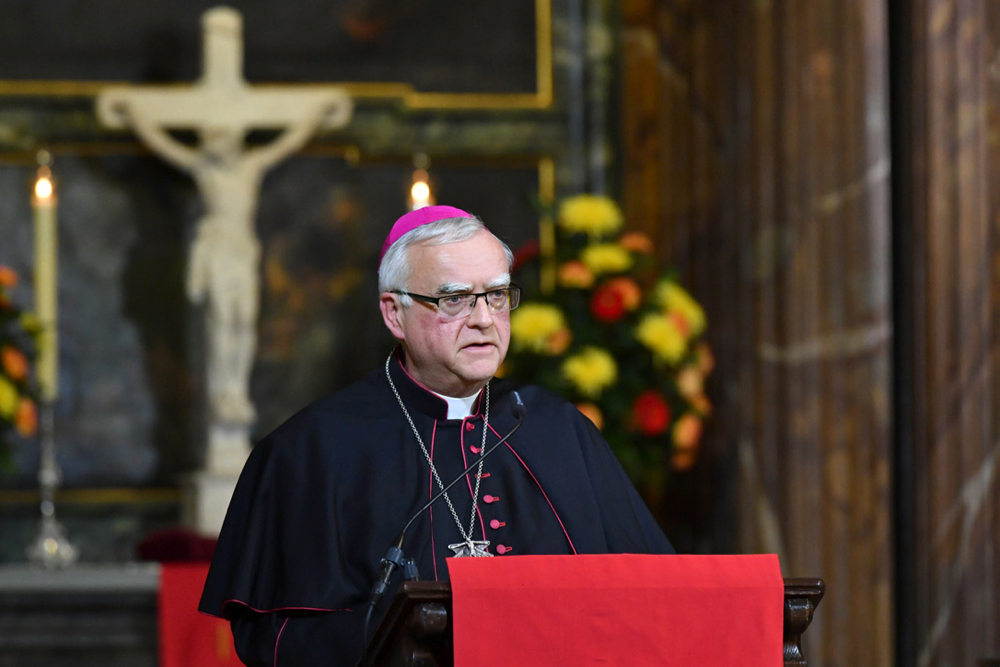13 December 2019, The Tablet
German bishops outline views on human sexuality

The Archbishop
of Berlin, Heiner Koch, speaking here in the Marienkirche in Berlin,
Photo: Christian Ditsch/DPA/PA Images
Photo: Christian Ditsch/DPA/PA Images
A key
group of German bishops attended an experts’ consultation on how to
discuss human sexuality in both scientific and theological terms in
Berlin from 3-4 December. Organised by the bishops’ conference’s
commission for marriage and the family, as a prelude to the synodal
procedure involving clergy and laity that begins in January 2010, the
bishops agreed according to their post-consultation statement “that
people’s sexual preference developed during adolescence and took on a
hetero- or homosexual form. Both belonged to the normal forms of a
sexual predisposition which is unalterable and should not be changed by
specific socialisation.”
The Berlin consultation was organised
together with the Institute for Christian Ethics and Politics (IPEC) and
attended by Archbishop Heiner Koch of Berlin, who is in charge of
family affairs in the German bishops’ conference, Bishop Franz-Josef
Bode of Osnabrück, Bishop Wolfgang Ipolt of Görlitz and Bishop Peter
Kohlgraf of Mainz, as well as several auxiliary bishops together with
medical experts and theologians. It is part of the two-year German
“synodal procedure” on church reform that was launched on the first
Sunday of Advent.
An explanatory text plus a summary of the
consultation was immediately published on the bishops’ conference’s
website. The commission for marriage and the family had wanted –
“already in the preparatory phase” of the synodal procedure – to
contribute to the discussions on sexual morality and to “discuss the
subject from the medical, anthropological and moral-theological point of
view as also to go into church teaching on sexual morality, its history
and background”, the bishops’ conference’s text explained.
It continued: “The chairman of the
commission for marriage and the family, Archbishop Heiner Koch,
emphasised that it was imperative for the synodal procedure to begin
impartially and without fixed positions but not without knowledge of the
present state of science... the bishops agreed that people’s sexual
preference was formed during puberty when it took on a hetero- or
homosexual form which is unalterable … This means that all forms of
discrimination against homosexuals must be rejected, as church teaching
demands and as Pope Francis expressly emphasised in Amoris Laetitia.”
However, the statement went on to
delineate areas of disagreement over the implications of this position:
“The bishops did not agree, however, on whether present church teaching,
which forbids the practice of homosexuality, was still up-to-date. They
also differed on the question of whether or not the use of artificial
birth control was permitted in marriage or in co-habitation. Archbishop
Koch and Bishop Bode underlined the importance of a sound discussion
supported by theology and the human sciences and highlighted the
developments that could already be found in Amoris Laetitia. Thus a
sexual relationship after divorce and remarriage was no longer always a
grave sin, neither did it always mean that the person concerned could no
longer receive the Eucharist, they recalled.”
The results of the Berlin consultation
will flow into the synodal procedure’s forum on “Life in succeeding
relationships – Living love in sexuality and partnership.”





No comments:
Post a Comment